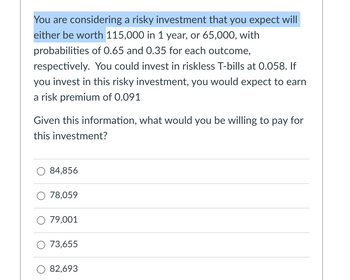Investing is a risky business, but some people are more willing to take risks than others. If you’re someone who can tolerate a risky investment, you’re likely to have certain personality traits that make you more comfortable with uncertainty.

Image: www.bartleby.com
In this article, we’ll explore the traits of someone who can tolerate a risky investment. We’ll also provide some tips and expert advice on how you can develop these traits if you’re interested in becoming a more risk-tolerant investor.
Understanding Risk Tolerance
Before we get into the traits of someone who can tolerate a risky investment, it’s important to understand what we mean by risk tolerance. Risk tolerance is a measure of how much risk you’re willing to take in order to achieve your financial goals. It’s important to note that risk tolerance is not the same as risk appetite. Risk appetite is the amount of risk you’re willing to take, regardless of your financial goals.
There are a number of factors that can affect your risk tolerance, including your age, investment goals, and financial situation. If you’re young and have a long investment horizon, you may be more willing to take risks than someone who is older and closer to retirement. Similarly, if you have a high net worth, you may be more willing to take risks than someone who is just starting out.
Traits of Someone Who Can Tolerate a Risky Investment
Now that we’ve defined risk tolerance, let’s take a look at the traits of someone who can tolerate a risky investment:
- They’re comfortable with uncertainty.
- They have a long investment horizon.
- They have a financial cushion.
- They’re well-diversified.
- They have a clear investment plan.
- They’re willing to do their research.
- They’re not afraid to seek professional advice
If you have these traits, you’re more likely to be able to tolerate a risky investment. However, it’s important to remember that even the most risk-tolerant investors can lose money. It’s important to invest wisely and to diversify your investments so that you can reduce your risk.
Tips for Becoming More Risk-Tolerant
If you’re not sure if you’re a risk-tolerant investor, there are a few things you can do to become more comfortable with risk. First, start by educating yourself about investing. The more you know about the markets, the more confident you’ll be in your ability to make sound investment decisions.
Second, start small. Don’t invest more than you can afford to lose. As you become more comfortable with investing, you can gradually increase the amount of risk you take. Finally, stay calm during market downturns. It’s normal for the markets to fluctuate, but it’s important to remember that the long-term trend is up. Don’t panic and sell your investments during a downturn. Instead, stay invested and ride out the storm.

Image: medicine.wustl.edu
FAQs
Q: What is the difference between risk tolerance and risk appetite?
A: Risk tolerance is the amount of risk you’re willing to take in order to achieve your financial goals. Risk appetite is the amount of risk you’re willing to take, regardless of your financial goals.
Q: What are some factors that can affect your risk tolerance?
A: Some factors that can affect your risk tolerance include your age, investment goals, and financial situation.
Q: How can I become more risk-tolerant?
A: There are a few things you can do to become more risk-tolerant, including educating yourself about investing, starting small, and staying calm during market downturns.
Someone Who Can Tolerate A Risky Investment Would
Conclusion
If you’re someone who can tolerate a risky investment, you’re more likely to be successful in the long run. However, it’s important to remember that even the most risk-tolerant investors can lose money. It’s important to invest wisely and to diversify your investments
Are you someone who is interested in tolerating riskier investments?